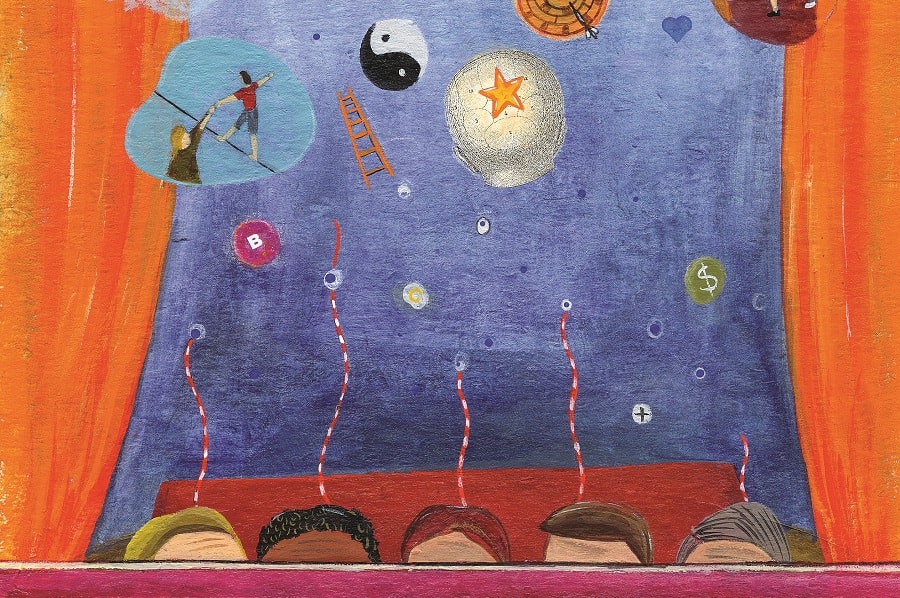The word “mentor” comes from Homer’s Odyssey. As Odysseus was preparing to fight the Trojan War, he realized he was leaving behind his only heir—his son Telemachus. Since “Tellie” (as he was probably known to his buddies) was only a teenager, and since wars tended to drag on for years, Odysseus recognized Tellie needed to be coached on how to become king while Daddy was off fighting. He hired a trusted family friend named Mentor, an old man both wise and sensitive, to be Tellie’s tutor. The moniker for that special relationship has lasted through the ages.
Fast-forward to today. The word “mentor” can conjure up an image of a seasoned sage conversing with a naïve, wet-behind-the-ears young artist. The conversation might be laced with informal rules, closely guarded secrets, and “I remember back in ’77…” stories of award-winning performances and daredevil heroics. Mentorship can provide power trips for dictatorial directors or buddy systems for lonely playwrights. It can also lead to influential relationships that nurture genius and greatness.
But how does mentoring work in the world of theatre? To gain insights American Theatre brought together a panel of five seasoned mentors and posed a series of questions. The panelists talked candidly and provided rich insights—insights that raised for me yet another question: How much of their approach to mentoring is shaped by the master-to-novice way of apprenticeship so prevalent in the DNA of the performing arts?
I live in the world of business, helping executives of major corporations become more effective mentors. My knowledge of the theatre, on the other hand, is limited to that of the typical patron who periodically enjoys a great play, dance piece or opera.
The juxtaposition of the rational world of business with the aesthetic world of the theatre may be mixing oil and water. On the other hand, just as there is much the world of enterprise can learn from that of the performing artist, there could be important things the theatre world can learn from business-style mentoring. To challenge and stimulate your thinking, I have added to our panel’s astute comments a few “talking points” drawn from the world of commerce. You be the judge as to their relevance.
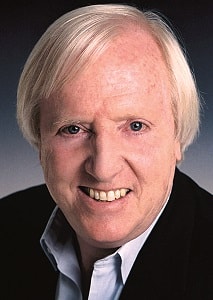
CHIP R. BELL: How would you define mentorship? How does it differ, say, from apprenticeship, collaboration or conversation?
EMILYA CACHAPERO: The key is in the relationship between the mentor and the mentee. Hopefully there is a chemistry that exists that allows honesty as well as a level of access for the mentee to meetings and conversations that an intern or an apprentice wouldn’t have.
KAMILAH FORBES: I think it’s definitely a direct, consistent and holistic type of relationship. It’s about empowering the artist or the manager in terms of guidance within their career—as opposed to collaboration, which is really more project-based.
ROBERT MOSS: It’s somebody more experienced taking on an assistant, somebody that you’re interested in, and guiding them along a certain path—in a way that helps them to see what you see.
DAVID HAWKANSON: The key thing about mentoring is—it’s about empowerment. When I have been mentored, the mentor had more faith and trust in my abilities and potential than I think I had in myself.
CACHAPERO: I think about mentors I’ve had in my career, and it’s exactly that—these are people who have said to me, “Well, go ahead and just do this.” They had visions far beyond where I could see. So I think it’s a lot about the mentor being a visionary and being generous.
MOSS: An early mentor of mine was Gordon Davidson, when I was still stage managing and became his assistant. I didn’t know what to do and I was sort of hanging around Phoenix Theatre [in New York]. He said, “You do whatever you see needs doing, and you will not step on my toes.” I blossomed, and he offered me, like a tugboat, a little guidance now and then as I moved up the ladder of stage managing. I always have thought of him as my mentor.
MICHAEL WELLER: I’ve always found that the difference between mentoring and pretty much any other engagement that you might have with an up-and-coming playwright is that you are sort of a portal to the world they’re trying to reach. The fact that they’re dealing with you means that they’ve suddenly stepped up a level to being taken seriously professionally.
TALKING POINTS: How would mentoring change if it were viewed as a partnership? Would the protégé take more risks and/or grow more rapidly if he or she felt more of an equal with the mentor? What would the relationship be like if there were obvious reciprocal learning being encouraged—mentor teaching protégé as protégé teaches mentor? Might the performing arts apprentice model be a liability when infused into a mentoring relationship?
Are there principles of mentoring that lead to success, or does it solely depend on the specific pairing of a mentor with protégé?

FORBES: I think the guidelines are just as specific as the individuals involved.
MOSS: Mentoring a playwright might be different from mentoring a young director. When I have assistants, one of the first things I say to them is: “You must always tell me the truth. If you lie to me or try to flatter me, our relationship is useless. I rely on you, even though you’re inexperienced, to tell me what you see.” Consequently a dialogue begins almost from day one.
CACHAPERO: The success depends on how well the mutual expectations match up. If the mentor wants somebody to fetch coffee and the mentee is really looking for a higher level of interaction, they’ve got to know that fact at the beginning in order for it to really bear fruit down the road.
HAWKANSON: It takes time. A successful mentoring relationship is a question of trust, faith and empowerment. And empowerment doesn’t happen overnight.
WELLER: I found that mentoring really is most successful when whoever you’re bringing along is somebody whose work you really love.
FORBES: You’ve got to make sure that mutual respect works across both lines, from mentor to mentee and vice versa.
HAWKANSON: I think another vital quality is the ability to fail. Part of the agenda is stretching them, and they can fail without causing undue damage to either side.
MOSS: I just realized that I’ve just gone through a three-year mentorship with Michael Edwards, who’s about to take over Asolo [Theatre Company in Sarasota, Fla.]. He came here [to Syracuse Stage] because he’d only been a freelance director and he wanted to see what it was like to be artistic director. So he became my ally, in a way, but it was a mentorship. He would go to every single meeting with me, and sometimes he would say things that perhaps were a bit inappropriate, or he would be over-eager. Afterwards, in my office, I would point out—as though I were directing a play—“I wonder if, as a character, you could have achieved your objective better if you had done this that way or the other thing.” We were incredibly honest with each other over the three-year period.
Talking points: Respect, trust, openness, clarity of goals and roles should be a component of every effective interpersonal relationship. Is mentoring different than “a good working relationship”? And, if so, how? What components in a relationship most foster learning, not just understanding? What, for example, are the roles of curiosity, humility and authenticity in a mentoring relationship?
Recalling mentoring relationships that were successful, how did they begin? What ensures a good start?
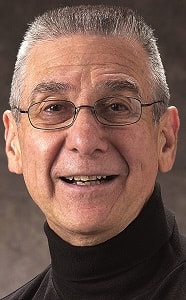
MOSS: When I’m interviewing an assistant director, for example, one of the things I ask them to do prior to our interview is to read the play and to come and talk to me about it for five minutes. That conversation doesn’t have to reflect my view of the play, but it does have to be interesting and thoughtful. So, it’s a really good conversation up front.
WELLER: It’s a little different in the case of a playwright, because you have a lot of evidence in front of you before the relationship begins. Usually, you have a whole play. If you begin with the fact that the mentee’s work has won attention somewhere, they’ll come very willingly to what you have to say. After that, it’s really a question of identifying how to say the one simple thing that will most help them. It’s easy to identify 50 problems for them, but it’s very difficult to narrow it down to one.
HAWKANSON: I think potential mentees have to be very strategic, as they put themselves into the partnership pool, about what they need, what they want to get out of it. Then they should look at the track record of their prospective mentor and ask: How well has that person placed other protégés in the past? What does the mentor have that the mentee does not know about? The mentor doesn’t necessarily think about that—he or she just wants a bright person around to do this and that.
CACHAPERO: A good start is young artists giving themselves the gift of time to pause for reflection and say, “Here I am now in my career, and what kind of person is going to help me jump forward?” Also, if the mentee is able to see the mentor in difficult situations that aren’t pretty and watch how they’re dealing with them, see how vulnerable they are—not this godlike persona up on a hill somewhere—then the mentee can start to say, “Okay, they might not always have all the answers.”
MOSS: Yes, Emilya, I would say that’s absolutely what I do: I establish their home base, usually a tiny desk in my office, so they’re here all the time and can see me grappling with artistic questions. Sometimes they get to see me not grappling well with the situation, getting the hits from left field that I have to cope with. That helps them grow enormously and cements our relationship.
HAWKANSON: I agree. As a young manager, what I remember most about my mentoring situations were the failures and not the successes. In fact, I think those were the most meaningful learning experiences as a mentee that I had. And organizational crisis is always a great learning experience. Unfortunately, it’s the very nature of what we are.
TALKING POINTS: Is there a healthy limit to mentor vulnerability? Are we giving the protégé the best role model when all our foibles are flaunted or exposed? Granted, humility is always a powerful feature of a learning relationship. But what subtle artifacts of power still creep into beginnings to make obvious vulnerability potentially suspect? Are mentors better off giving the protégé a sampler of the mentor’s vulnerable side, or do we need to show off our clay feet as proof we are being completely real?
Are there important dos and don’ts for mentoring in the theatre world?
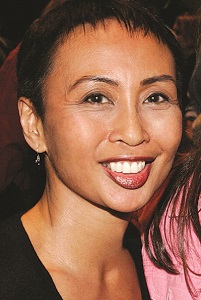
CACHAPERO: It’s so hand-tailored to the individual relationship….
FORBES: I’d have to agree—I think it’s really specific to the people involved.
MOSS: I try to say “yes” as often as possible to them.
HAWKANSON: I was going to say the opposite. [laughter] Just kidding!
MOSS: But, see, you’re in management, and I’m talking about directing, so it’s different.
HAWKANSON: Exactly! Managers are trained to get up in the morning, look in the mirror and learn how to say “no” and smile.
TALKING POINTS: Still, might there be universal dos and don’ts to mentoring, no matter how tailored the relationship? From my own observations, I’ve concluded that great mentors foster discovery, they don’t instruct. Great mentors know that thought-provoking questions are much more powerful than smart answers. Great mentors know that harsh criticism and guilt minimize creativity and freedom to experiment. Great mentors know that superior listening comes from genuine curiosity and obvious attentiveness. Great mentors give feedback with a strong focus on the future, not a heavy rehash of the past. Great mentors try to catch protégés doing things worthy of affirmation. Great mentors focus on helping the protégé transfer learning to performance; they do not just rely on wisdom-filled dialogues.
What are the particular challenges for a mentorship in the theatre field?
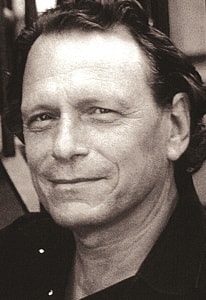
WELLER: In playwriting, the big one is getting people not to defect into movies.
CACHAPERO: A major challenge is finding the time to sit down and have substantive discussions when so many other things are pulling at us, including the demands of our organizations.
FORBES: I think another challenge is self-esteem and empowerment. It’s difficult to empower other people, particularly younger artists, when you are not fully empowered yourself as an artist and not feeling in a completely secure place in your own life or in your career within the field.
WELLER: A lot of young writers are trying to find the play to write that they think has the maximum chance of being done. One of the things I have to say to some of the young writers is: “Stop trying to accommodate all the time. You’ve got to push the envelope. You have to honor your own deep sense of subjectivity. Most of the other professions in theatre are involved with accommodating and looking for opportunity. You’re the only one who can demand the absolute full right of your own deep subjective experience. All you have is the page to deal with—you don’t need to worry about where it goes from there.”
MOSS: I say the same thing. “You’ve got to direct something from your heart. Don’t direct something that you think will catch somebody’s eye or go to Broadway.”
TALKING POINTS: Is encouraging a young artist to “follow your dream and be true to yourself” completely realistic? What about the artist trying to craft his or her best work while supporting a family and meeting a mortgage? Do mentors best serve their protégés solely by fanning the flame of creation, or are protégés better served by helping them learn to manage tradeoffs responsibly and effectively? Where does tough love fit in the anatomy of mentorship?
Are there times when diversity between mentor and protégé—gender, race, age, lifestyle, etc.—makes the mentoring relationship particularly challenging?
WELLER: I think for people for whom that is a problem, it’s a problem—and for people for whom it isn’t, it isn’t.
CACHAPERO: There’s got to be an understanding and sensitivity to differences. Very few of my own personal mentors have been people of color. But the folks that have mentored me have had a clear understanding of my political leanings, my cultural perspective and my background, and have said, if they didn’t understand something, “I don’t understand that. Can you explain it to me?”
WELLER: It seems no different to me than checking into the specificity of anybody’s life that you’re dealing with. I never see it in terms of gender or race or whatever. If there is too much emphasis on difference—if you are suddenly aware that you’re dealing with an Albanian, or a Chinese transvestite, and this becomes the center of your attention—you need to come to terms with the fact that this is just a person with a specific background and a specific point of view.
CACHAPERO: But those kinds of things inform their work and their view of the world, so you can’t totally put it to the side.
WELLER: Exactly. Except everything informs everybody’s work! That’s where you can’t get trapped in the situation of pigeonholing any way at all in the arts.
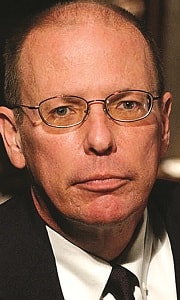
HAWKANSON: I don’t think that successful mentoring necessarily has to involve shared cultural values. I’ve learned a lot from people whose values I do not agree with. It doesn’t have to be a totally consensus-like process.
FORBES: I definitely agree with you on that point. However, being an artist of color, I think it’s very important to be able to have that legacy validation—to be able to see someone who has come before you in very similar conditions, from a similar background, and can relate and also guide you along the path. Well, this is the path that I’ve taken as an artist of color. Yes, there are very few doors open to artists of color, particularly in the art world. It’s very important, particularly for mentees of color, to have that in place.
TALKING POINTS: Are we kidding ourselves that major differences are really ignored in a mentoring relationship? Granted, we would like to think everyone in the arts world is not adversely impacted by differences. But if we look at access, opportunity and the ratio of “insiders” to “outsiders,” can we conclude that success is determined solely by talent and performance? Might obvious differences like race or lifestyle warrant at least a conversation initiated by the mentor? If we all see the “elephant in the room,” pretending it does not exist doesn’t make the elephant disappear.
How do you determine if a mentorship worked or didn’t work?
MOSS: In the short run, it works if there’s a real give-and-take between the two of us. Then, if we really clicked, I will continue to try to go to see their work, wherever it is, and meet with them and say, you know, “I thought you did this well.”
FORBES: I think you know when a mentoring relationship has worked when it doesn’t end. I feel, again, that it’s a holistic, long-term relationship that doesn’t happen over the course of a year or two—that you really become integral in each other’s lives.
HAWKANSON: I agree with you, but I would say helping a person decide they are not right for this profession can be a successful mentoring situation as much as them being on Broadway. It goes both ways.
CACHAPERO: But the level of independence, I think, starts to change over the course of a mentorship, too. As it progresses there are different types of responsibilities that a protégé takes on, and they can fly solo a lot more of the time. And the questions they come back asking are more sophisticated. Maybe they’re still on the same theme, but there’s a higher level of questioning that happens.
TALKING POINTS: What impact does “forever and ever” have on letting go and encouraging protégé independence? Might the notion of “forever your mentor” keep both mentor and protégé trapped in a teacher-student relationship? When does the protégé become a completely self-directed learner? At what point in the relationship does the mentor completely let go and view his or her former protégé solely as a professional colleague?
If a colleague were planning to be a mentor, what’s the one warning you would provide? And what single benefit would you predict?
CACHAPERO: One benefit I’d predict is that you’ll learn as much, if not more, than your mentee. And also that you’re going through uncharted territory because there hasn’t ever been your specific relationship before, and you’ve got to define it and figure it out as you go. My warning would be: Don’t assume you know what is in the other person’s head. You’ve got to ask them.
MOSS: Be prepared for the human situation that it entails.
WELLER: Start prepared to stick with them. The reward can be tremendous.
FORBES: Guiding someone else’s career is a huge responsibility. A lot of times you don’t know who you are ultimately dealing with 10 or 15 years down the line. So, take that role seriously.
HAWKANSON: You’ll grow. If you’re smart, they’ll teach you something. It happens by shared experience, by shared crisis. My warning is: Don’t try too hard. A mentoring relationship works best when the mentor recognizes and finds the value and worth of that individual.
CONCLUSIONS: The mentor is a teacher, a guide, a sage—and foremost a person acting to the best of his or her ability, in a whole and compassionate way, in plain view of the protégé. No greater helping or healing can occur than that induced by a model of compassion and authenticity. Mentoring is about being real, being a catalyst and being sometimes a kind of prophet. It is therefore far more art than science. The most powerful and difficult part of mentoring is being who you are.
Passionate mentors recognize that effective learning has a vitality about it that is not logical, not rational, not orderly. Such mentors get carried away—inspiringly so—with the process of learning. Some may exude emotion quietly, but their cause-driven energy is clearly present. In a nutshell, mentors not only love the learning process, they love what the protégé can become—and they passionately demonstrate that devotion.
CHIP R. BELL, moderator, is a senior partner with the Chip Bell Group and manages its headquarters office near Dallas. He is the author of several best-selling books, including ‘Managers as Mentors: Building Partnerships for Learning’ (Berrett-Koehler, 2002). His firm consults with major corporations around the world on ways to create a culture that supports long-term customer devotion.
EMILYA CACHAPERO is the director of artistic programs for Theatre Communications Group and administers the New Generations Program and the NEA/TCG Career Development Program for Directors and Designers, both of which include mentorship components.
DAVID HAWKANSON is executive director of Steppenwolf Theatre Company in Chicago. He previously served as managing director of the Guthrie Theater in Minneapolis, Hartford Stage in Connecticut and Arizona Theatre Company in Tucson and Phoenix.
KAMILAH FORBES is an actress, director and playwright and is artistic director for both the NYC Hip-Hop Theater Festival and Hip-Hop Theater Junction.
ROBERT MOSS is artistic director of Syracuse Stage in Syracuse, N.Y. He founded New York City’s Playwrights Horizons in 1971 and served as its producing director for 10 years and later as director of the Playwrights Horizons Theatre School, affiliated with the undergraduate program of Tisch School of the Arts. He also spent 15 years as artistic director of the Hangar Theatre in Ithaca, N.Y.
MICHAEL WELLER is a playwright (‘Moonchildren,’ ‘What the Night Is For’) and co-founder of Cherry Lane Theatre’s Mentor Project, which matches emerging writers with mentor playwrights for a season.

